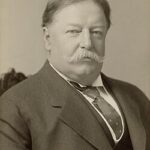The Dollar Diplomacy Decision
President William Howard Taft launched dollar diplomacy in 1909 as America’s new foreign policy approach. This strategy replaced military force with economic investment and financial leverage. Taft believed American business investments could secure peace while generating profits. The policy aimed to extend American influence through Wall Street rather than warfare. 💰
Corporate-Driven International Relations
Dollar diplomacy encouraged American banks and corporations to invest heavily in foreign markets. The State Department actively promoted these business ventures as diplomatic tools. Taft’s administration viewed economic penetration as more civilized than military conquest. This approach promised mutual benefits for American businesses and recipient nations. However, critics immediately questioned prioritizing corporate profits over genuine diplomatic relations.
Global Implementation Strategy
The policy targeted strategic regions including Latin America, East Asia, and the Caribbean. 📊 American companies received government backing for major infrastructure projects abroad. Banks extended loans to foreign governments under favorable terms for U.S. interests. The administration coordinated closely with business leaders to identify investment opportunities. This collaboration blurred traditional boundaries between government diplomacy and private enterprise.
Impact:
Military Interventions and Regional Backlash
Dollar diplomacy quickly led to armed interventions when investments faced threats. U.S. Marines landed in Nicaragua in 1912 to protect American financial interests. Similar military actions occurred in Honduras and the Dominican Republic. 🔥 These interventions contradicted Taft’s promise of peaceful economic engagement. Local populations viewed American forces as corporate enforcers rather than peacekeepers.
Anti-American Sentiment in Latin America
Latin American nations strongly condemned dollar diplomacy as economic imperialism disguised as friendship. Mexican leaders rejected American investment proposals citing sovereignty concerns. 🌍 Central American countries experienced political instability from competing U.S. corporate interests. The policy damaged America’s reputation throughout the Western Hemisphere for decades. Regional leaders began seeking European alternatives to American investment.
Long-Term Diplomatic Consequences
Dollar diplomacy failed to achieve lasting stability or genuine partnership abroad. The policy created dependency relationships that bred resentment rather than cooperation. 📉 Woodrow Wilson abandoned this approach upon taking office in 1913. However, the legacy of corporate-driven foreign policy continued influencing American international relations. Critics argue this precedent encouraged later controversial interventions prioritizing economic over humanitarian concerns.
